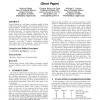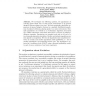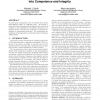111
click to vote
AAAI
2006
15 years 4 months ago
2006
To prevent or alleviate conflicts in multi-agent environments, it is important to distinguish between situations where another agent has misbehaved intentionally and situations wh...
117
click to vote
ATAL
2008
Springer
15 years 4 months ago
2008
Springer
Reward shaping is a well-known technique applied to help reinforcement-learning agents converge more quickly to nearoptimal behavior. In this paper, we introduce social reward sha...
124
click to vote
ECAI
2006
Springer
15 years 6 months ago
2006
Springer
Abstract. Computational Game Theory is a way to study and evaluate behaviors using game theory models, via agent-based computer simulations. One of the most known example of this a...
138
click to vote
ATAL
2006
Springer
15 years 6 months ago
2006
Springer
In many Multi-Agent Systems (MAS), agents (even if selfinterested) need to cooperate in order to maximize their own utilities. Most of the multi-agent learning algorithms focus on...
129
click to vote
ATAL
2006
Springer
15 years 6 months ago
2006
Springer
This paper focuses on the Noisy Iterated Prisoner's Dilemma, a version of the Iterated Prisoner's Dilemma (IPD) in which there is a nonzero probability that a "coop...
123
click to vote
ACSC
2004
IEEE
15 years 6 months ago
2004
IEEE
Table 1 shows the payoff to player one. The same matrix also holds for player two. Player one can gain the maximum 5 points (T = 5) by defection if player two cooperates. However,...
145
click to vote
EPS
1998
Springer
15 years 7 months ago
1998
Springer
The Classical Iterated Prisoner's Dilemma (CIPD) is used to study the evolution of cooperation. We show, with a genetic approach, how basic ideas could be used in order to gen...
215
click to vote
EPS
1998
Springer
15 years 7 months ago
1998
Springer
We investigate the following question. Do populations of evolving agents adapt only to their recent environment or do general adaptive features appear over time? We find statistica...
116
Voted
GECCO
2005
Springer
15 years 8 months ago
2005
Springer
The iterated prisoner’s dilemma is a widely used computational model of cooperation and conflict. Many studies report emergent cooperation in populations of agents trained to p...
105
click to vote
ATAL
2005
Springer
15 years 8 months ago
2005
Springer
In multi-agent communities, trust is required when agents hold different beliefs or conflicting goals. We present a framework for decomposing agent reputation into competence—...



